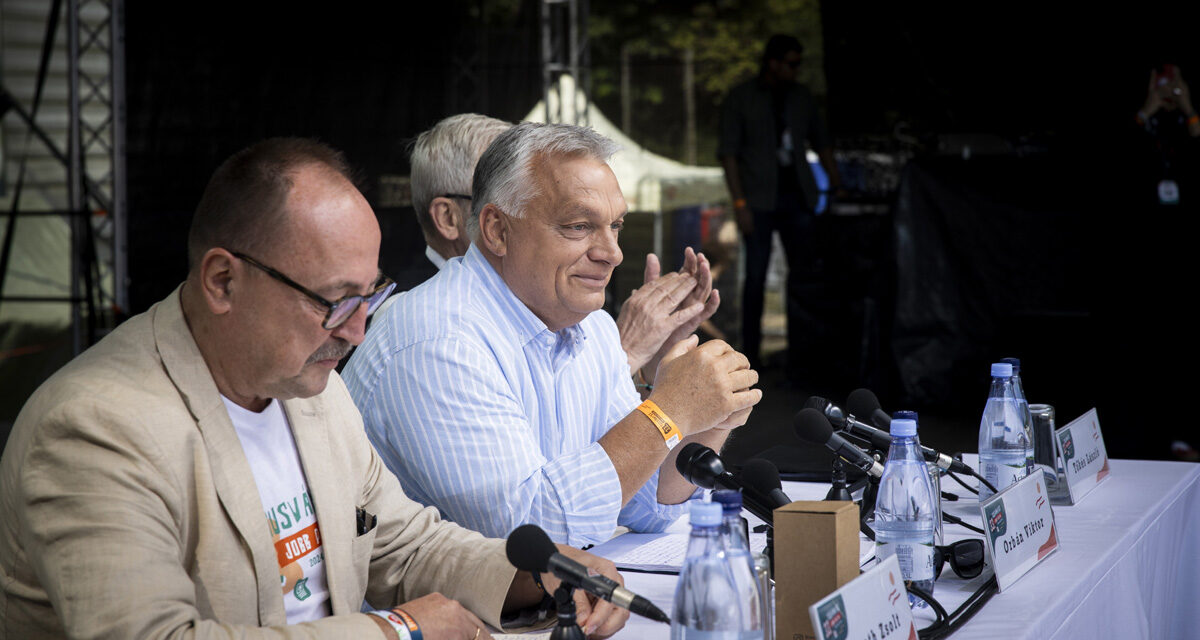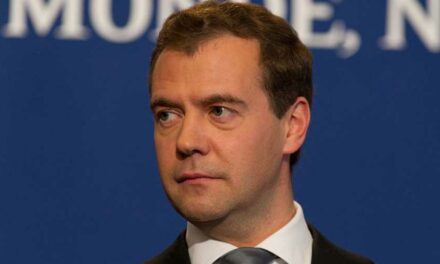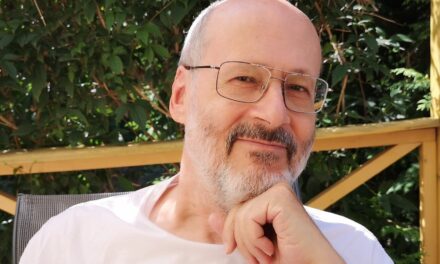The Prime Minister also formulated a number of previously unheard-of foreign policy ideas - and refuted some of the stereotypes associated with him. Written by Mátyás Kohán.
For the umpteenth time, Prime Minister Viktor Orbán gave a long lecture at the Free University of Tusványos, and his speech this year was not at all what his critics said in connection with his annual review in February or his speech at the Peace March in May: that the lecture would have been a kind of "best of Orbán", full of with the platitudes of government communication recycled a thousand times over.
The prime minister's speech contained a number of foreign policy ideas that had never been expressed openly by a Hungarian government politician before.
and as a result, the Hungarian foreign policy, which has a separate path in Europe, also came into a new light.
We have gathered these thoughts into a bouquet.
The first and longest part of Orbán's presentation was about the truths of European politics that the war brought to the surface, and already in this part we can find many new ideas.
A significant part of the opposition statements interpreting the prime minister's speech went all the way to the prime minister's first point, the description of the Ukrainian and Russian war position, and from this they came to some serious interpretations - for example, as Zsolt Sarkadi said on the Telex, that "the prime minister only forgets that that of the two reality assessments he outlined, the first is the so-called truth, and the second is Russian propaganda".
Meanwhile, Orbán has perhaps never given a speech that was so understanding of the Ukrainian war stance, and at the same time so distant from the Russian stance.
He said that "if it depends on the two sides, there will be no peace, peace can only be brought from the outside" - that is, he refuted all the rumors that according to the Hungarian government only Ukraine and the West were pro-war, and made it clear that Vladimir Putin's Russia is also , since they are not open to an immediate settlement either, for the sake of peace, as well as the Ukrainians, they must also be under pressure.
Regarding the two truths of the two warring parties (the Ukrainians are in self-defense against an aggression that violates international law, the Russians are fighting against the stationing of NATO troops in Ukraine), he said that their truths are "perceived or real" - that is, of course, he did not accept both truths as true, only he said that the two warring parties are driven by these two interpretations of reality.
This point was followed by a completely new train of thought; Since the outbreak of the war, Viktor Orbán has never addressed such long open praise to Ukraine.
He said about Ukraine that the country's "strength and resilience exceed all expectations", and despite the brutal level of emigration, corruption, and the very weak functioning of the Ukrainian state for decades, "it is actually a strong country", which found a vocation in the war, "its new mission is to to be the eastern border region of the West", thereby belonging to the West, "and this brought it into an active and active state".
Just a few weeks after the introduction of the Lukoil sanction, which seriously threatens Hungary's energy supply even in the medium term, the Hungarian Prime Minister also came up with a very calm and objective explanation regarding the aggressive Ukrainian demands -
according to him, "what we, non-Ukrainians, see as aggressive demands" is actually "the demand of the Ukrainians to officially recognize their vocation internationally" as a bulwark of the West.
This point makes it clear: the prime minister understands exactly what Ukraine is up to, what it wants to fight for - it's just that he doesn't believe that their strategy could be crowned with success.
What he said about Russia after that is also a new idea, and one that everyone who has ever visited any of the more successful, dynamic post-Soviet countries - Georgia, Azerbaijan, Kazakhstan, Kyrgyzstan, Uzbekistan, and on a different track Estonia - feels: "this country's economic its adaptability is outstanding" according to the Hungarian Prime Minister, who sees it as a lie that Russia is a "rigid, neo-Stalinist autocracy" and instead considers it a technically and economically flexible country. Entrepreneurship and spontaneity are characteristic of all the post-Soviet countries that have successfully caught up in their own way.
Another key paradox behind Orbán's idea is still worth understanding in order to understand, for example, why the sanctions regime was not successful in crushing Russia:
the massive formal and informal influence of the Russian state over the actors of the Russian economy is not simply corruption that breeds nepotism and inefficiency, but also the guarantee that the Russian economy can effectively prepare for and adapt to shocks of a political nature.
The other important – and new – idea concerns the Polish strategy that changed with the outbreak of the war, i.e. before Donald Tusk took office.
The prime minister claims nothing less than that the traditional power center of European politics, the French-German tandem - whose semi-peripheries with independent powers, the southern European states and the V4 appeared in the shaping of European politics - has lost its dominance.
In Europe, instead, today the trade winds are blown by the British-Polish-Ukrainian-Baltic-Scandinavian axis, in close cooperation with the United States.
In his opinion, despite the politically very delicate relationship with the German chancellor, Orbán has negotiated separately at least once a year since 2021, so his insights can be said to be very informed – this explains the gradual drift of the Germans from peace policy towards increasingly intensive arms deliveries:
Olaf Scholz really only wanted to send helmets in the Russo-Ukrainian war and he really did not want the sanctions regime to extend to energy policy as well.
However, in the new European power reality, Germany and France, which are already economically ailing, no longer direct the Union's policy according to the interests of continental Europe, since the Anglo-Saxon-Polish-Ukrainian-Baltic-Scandinavian alliance has been stronger since the war - and Scholz and Emmanuel Macron have joined this into politics.
In other words, they do not pursue the Ukraine policy that they want based on the interests of continental Europe, but what the other axis of power, which is above them, allows them to do.
("Don't think that this man has lost his mind. He's just crazy. He is very much in his right mind, and he sees exactly that the Americans and the liberal public-opinion-influencing tools they influence ... use public opinion to punish the German-French policy that does not suits American interests.”)
By the way, Orbán identified Hungary's interest against the new axis with that of the continental powers with this idea, and in the rest of the speech he made positive statements about French President Macron several times.
The prime minister has already spoken about the isolation of the West's position regarding the Russo-Ukraine war, but now he explained who he considers surprising that they either openly or tacitly sided with Russia in connection with the war: he included Iran and the Sunni the Muslim world (of which Russia is really not a natural ally at all for religious reasons), as well as Turkey and India. According to him, this is the first time that the international community is not willing to do what the West orders. "The West has also expressed its expectation that the world take a stand against Russia and with the West on a moral basis. On the other hand, the reality has become that everyone is slowly supporting Russia," warned the prime minister.
In the speech, Orbán also talked about the basis of the continuous rifts between Hungary and the EU mainstream: he identified this in the fact that, while "the Central Europeans" consider the nation-state to be an important value, which is rooted in national culture, carries common moral convictions, and can pursue a sovereign foreign policy,
until then, Western European countries entered a post-national state, for them the nation-state is a legal abstraction that can be overcome.
These two basic positions are incompatible, as they lead to a fundamentally different approach, for example, in relation to migration - ethnic homogeneity is a self-value in the nation-state, but insignificant in the post-national state. (Among others, István Szent-Iványi, opposition foreign politician, former member of the European Parliament and ambassador to Ljubljana, assessed the speech as saying that Orbán "tried to present this idea as if it were not his private opinion or the position of his government, but the EU - and would represent the criticism of the Eastern European side, although no one has authorized it and does not stand for it, since no one, except the Slovak government, agrees with it". in the European region, the only government that shares Orbán's opinion is in Slovakia,
In Austria, the Czech Republic, Slovenia, Croatia and Bulgaria, a party that thinks this way is leading the opinion polls.
and it can be strongly assumed that a significant proportion of those who vote for the local branches of the European People's Party are represented by those with a national commitment - in such a light, what the Prime Minister claims about Central Europe is also true for Latvia, Lithuania, Poland and Romania - strictly in terms of the national-post-national dichotomy, i.e. not including the extent to which these parties represent the same position as Fidesz on all other issues.)
Orbán also said that an acceptable European integration plan for Western European countries is to leave only a small nation-state, and concentrate powers as much as possible in Brussels.
This idea was explained in more detail and in a way that had not been heard before, by the minister responsible for European Union affairs, János Bóka, also in the Tusványos camp. According to him, there are two schools of thought for cooperation on European integration: according to one, the essence of European integration is for the member states to cooperate in those areas in which their joint action is more effective, and thus the measure of cooperation is the effectiveness of the action.
According to the other, the essence of European cooperation is the deepest possible integration, thus the measure of cooperation itself is whether a common European policy is created in as many areas as possible, regardless of its effectiveness.
Bóka immediately listed three major EU programs, which are proof of the dominance of the second school in EU thinking: the EU did not achieve even close to the nominally set goals of these three strategies, but the implementation of the strategies served as an excuse for more and more, in the basic EU treaties, powers assigned to member states should be transferred to Brussels. According to him, this was the Lisbon Strategy, which intended to make the EU the most advanced knowledge-based economy in the world by 2010, and although it did not achieve this, it did give birth to economic policy coordination mechanisms; Europe 2020, whose targets were "of course not reached by the European Union by 2020", but in the meantime integration continued to deepen; and, according to him, the Fit for 55 climate strategy, whose climate goals "will not be realized even now", but thanks to this, the EU can create an economic development program "which completely deprives the member states of the possibility of developing an independent economic policy".
In addition to all this, Viktor Orbán spoke for the first time about two challenges that are straining the West.
One of them, according to him, is that "the post-national state creates the political problem of the elite and the people, of elitism and populism": that is, while the people's position shifts to the right in a significant number of important matters (this is clearly supported by the results of the European Parliament elections ), "the elites condemn the people" for this, and they refuse to represent this change in politics - thus the trust between the people and its political elite ceases, which, according to Orbán, makes representative democracy impossible.
There is an elite that does not want to represent the people, and here is the people that are not represented - the prime minister formulated the essence of the problem.
Another problem is the weakening of Western soft power: as he states, Western values could be set as universal, i.e. beneficial and obligatory for everyone, as long as "modern development" and prosperity were exclusively Western.
However, since the Chinese, Arabs and Turks were also able to become modern "not at all based on Western values", that is the end,
from the point of view of prosperity, the developing world no longer sees these values as unavoidable - thus Western values are "demonstratively unacceptable in more and more countries of the world", so today, for example, the United States is not a resource from the point of view of global soft power, but a distinct disadvantage, as forces LGBTQ ideology on its allies.
The Prime Minister then spoke at length about the path he plans for Hungary along the lines of all these insights - however, the details of this belong to another page. However, we have to mention one new element in closing:
For the first time, the Prime Minister is speaking openly about the fact that Hungary is in a serious strategic dilemma regarding the change in the world order.
We can consider the change in the world order as a threat, as the European Union is doing almost in unison outside of it - this would result in close cooperation with the USA and the EU, and the identification of the Hungarian national interest with their interests. Or we can consider the change in the world order as an opportunity, which requires the development of one's own development path, different from the one designated by the EU mainstream, and requires initiative and change. In addition to his repeated, firm and pragmatically grounded stance in favor of our country's EU membership, the Prime Minister took the latter position, after explaining at length that the boundary conditions for Hungary to do so also exist in the relationship with the United States, the EU and China - at the same time, he also made it clear by outlining the dilemma: For Hungary, there is not only the strategy that was outlined in detail at the Tusványos lecture, and in the event that the change in the world order would pose a threat to our country, alignment with the mainstream EU policy would be justified.
Cover image: Prime Minister Viktor Orbán will give a lecture at the 33rd Bálványosi Summer Free University and Student Camp at Tusnádfürdő in Transylvania on July 27, 2024.
Next to him is Zsolt Németh, the Fidesz chairman of the Foreign Affairs Committee of the National Assembly (b) and László Tõkés, the chairman of the Transylvanian Hungarian National Council (EMNT) (in cover). Source: MTI/Prime Minister's Press Office/Zoltán Fischer













